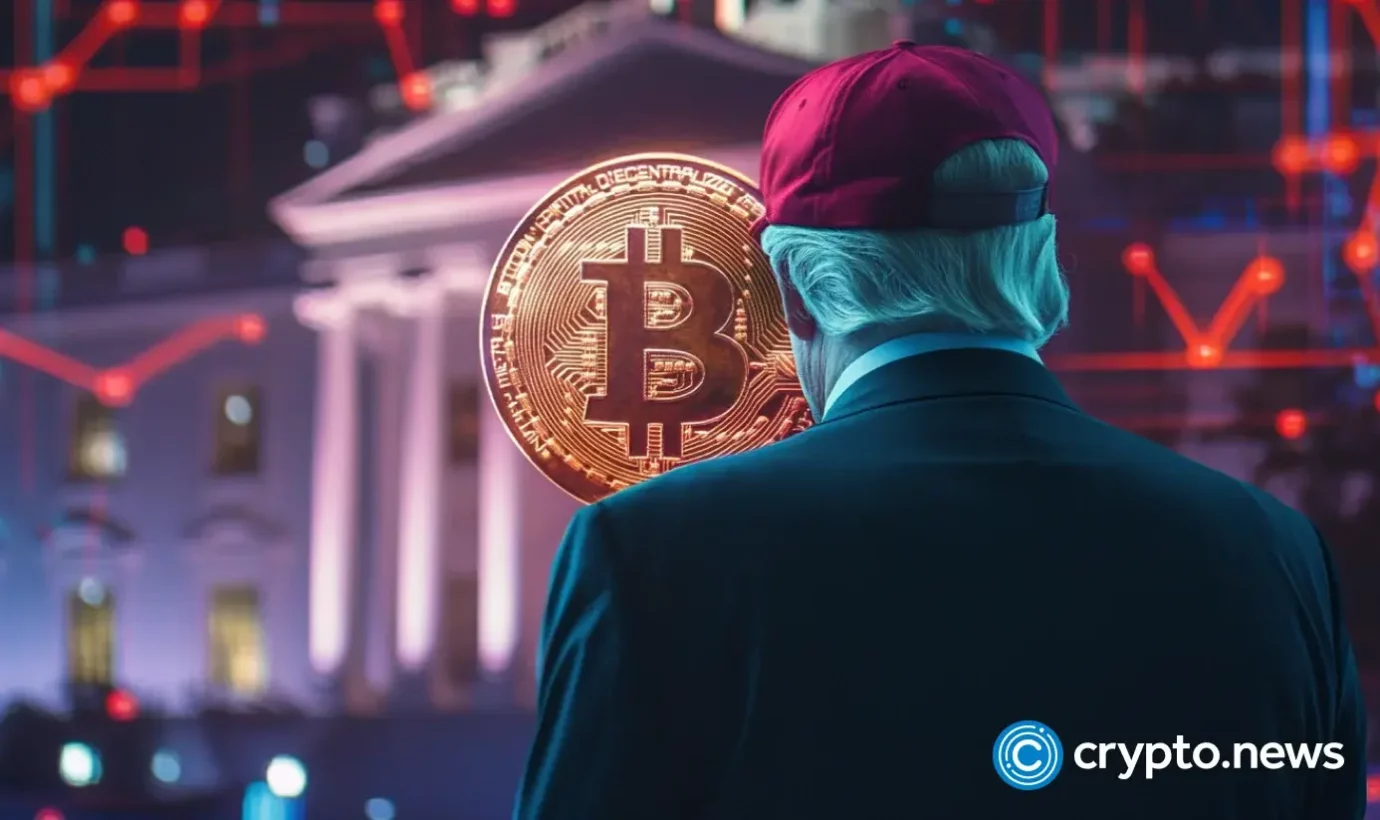Did crypto hand Donald Trump the White House?

How deep did crypto’s influence go in this election? Did Bitcoin and blockchain backers help push Trump back into the Oval Office?
Table of Contents
A crypto-powered return to the White House
The recent election handed Donald Trump a strong victory with 312 electoral votes, returning him to the White House. But what stands out this time isn’t just the numbers or campaign talk — it’s crypto.
Over the past year, crypto has evolved from a niche interest to a major topic on the political agenda, with crypto-friendly candidates now holding key seats in Congress.
In the Senate alone, pro-crypto candidates claimed 18 seats, while anti-crypto candidates held only 12. Across Congress, 266 pro-crypto candidates were elected, leaving anti-crypto voices trailing at 120.
This shift in sentiment isn’t coincidental. According to a Grayscale report from September 2024, voter awareness of crypto climbed to 53%, up from 47% in December 2023.
In fact, 71% of voters feel it’s crucial for political leaders to embrace new technologies, like blockchain, to keep America competitive on the world stage.
More notably, 56% of voters said they’d be more likely to back a candidate open to learning about crypto—up from 48% last December. The election results now confirm this trend.
With Trump’s second term backed by a crypto-receptive Senate and Congress, questions arise: What role did crypto play in his win, and how might it influence his term? Let’s explore what experts think Trump’s victory means for crypto’s future.
How crypto funding shaped key races
Crypto played a massive role in Trump’s victory, transforming from a fringe industry into a powerful political force. The industry put its weight behind pro-crypto candidates across the country, making strategic donations and funding ads in states where races were close.
Across the country, crypto-backed candidates gained ground, with groups like Fairshake and Defend American Jobs pouring over $135 million into more than 50 crucial congressional races.
In Ohio, for example, the Republican candidate Bernie Moreno received $40 million in crypto-funded ad support from pro-crypto super PACs, helping him defeat Sherrod Brown, a Democrat known for his critical stance on crypto regulation and chairing the Senate Banking Committee.
PACs didn’t just limit its influence to Ohio. The PAC spread funds across over 50 races, including critical battles in Arizona, Indiana, and Maryland.
In West Virginia, for instance, DAJ’s $3 million campaign to support Jim Justice paid off, flipping a previously Democratic seat in favor of a pro-crypto Republican. Justice clinched the race with a solid 69% of the vote.
The crypto industry also supported figures like Indiana’s Jim Banks, who successfully captured the Senate seat with 54% of the vote after a substantial push from crypto-backed ads.
But this support wasn’t just for pro-crypto Republicans. In New York, Senator Kirsten Gillibrand, a Democrat known for her supportive stance on crypto, was re-elected. Crypto support crossed party lines, showing that the industry isn’t confined to one political party.
Yet not every race went in crypto’ favor: in Massachusetts, Senator Elizabeth Warren, a well-known critic of crypto, won her third term despite her opponent John Deaton’s $2 million in industry backing.
By Election Day, crypto firms had spent over $50 million in states from California to Iowa, ensuring that both Democrat and Republican candidates with favorable views on crypto received support.
The results were also celebrated by industry figures. Tyler Winklevoss, co-founder of Gemini, said, “The crypto army is striking,” following Moreno’s win.
For Coinbase’s Chief Legal Officer Paul Grewal, the night’s results showed that “crypto wins.”
Faryar Shirzad, Coinbase’s Chief Policy Officer, also chipped in: “Across the ballot and on both sides of the aisle, crypto won this election.”
For Trump, support from key industry figures like the Winklevoss twins, Marc Andreessen, and Ben Horowitz played a part in his electoral sweep. Together, they contributed a combined $10 million, helping Trump reach $22 million in total industry donations.
As the votes rolled in and crypto-friendly candidates celebrated their wins, Bitcoin (BTC) surged past $75,000, reaching a peak of $76,940 on Nov. 7, reflecting market confidence in a friendlier political climate for crypto.
As of Nov. 14, BTC is trading at $89,300 levels, with bullish sentiments intact.
Experts take on Trump’s victory
To explore the impact of crypto on Trump’s win, crypto.news reached out to industry experts for their insights.
According to Nitin Gaur, co-founder and CTO of Stealth Startup, this election marked crypto’ true entry into the political stage.
“Crypto became a voter agenda,” Gaur noted, saying it wasn’t just about donations but about rallying a new kind of voter around themes like innovation and personal freedom.
Gaur also credited high-profile supporters like Elon Musk and RFK Jr., whose backing helped the pro-crypto agenda resonate with voters across party lines.
Jakob Kronbichler, CEO of Clearpool, pointed out how Trump’ campaign reached crypto holders directly.
“Trump rallied this community by pledging to transfer the 207,000 bitcoins held by the DOJ to the Treasury as a strategic reserve.”
This promise, combined with Trump’s stance in favor of DeFi, struck a chord with crypto enthusiasts who had grown wary of SEC crackdowns.
Slava Demchuk, CEO of AMLBot, noted that Trump’s focus on crypto allowed him to expand his reach beyond the traditional conservative base.
“About 1 in 7 voters in the U.S. own cryptocurrency,” Demchuk explained. By prioritizing crypto, Trump connected with a diverse crowd — young adults, people of color, and especially men under 40 — many of whom felt unheard in other political discussions.
Moreover, even Demchuk believes that Trump’ strong ties with Musk also amplified his appeal among these groups, especially on platforms like X where crypto enthusiasts are active.
A new era? What Trump’s administration holds for crypto
With Trump set to reenter the White House, industry leaders are hopeful his campaign promises will lead to real changes that benefit crypto.
Kronbichler expects “clearer regulations” to be one of the first steps, as a more supportive Congress and a crypto-friendly president could resolve the legal gray areas that have slowed DeFi and blockchain projects.
“We’re expecting growth in DeFi as regulatory pressure lightens,” he shared, a sentiment echoed widely in the industry.
Demchuk believes that Trump’s likely replacement of SEC Chair Gary Gensler could create a turning point for crypto.
“The SEC might move from investigating to supporting crypto innovation,” he suggested, describing a possible shift toward helping crypto firms manage rather than face obstacles in the regulatory system.
Meanwhile, Will Adams, SVP of Partnerships at MatterFi, commented on the clarity Trump’s campaign brought to the future of crypto, with a strong intention for the U.S. to lead globally in the digital asset space.
Currently, under the SEC’ SAB-121 rule, banks must treat crypto assets in custody as liabilities — a major barrier for banks looking to manage crypto assets.
“Removing those restrictions could prompt more retail interest in BTC.”
Adams said banks could handle crypto without facing huge capital requirements. Such changes, he added, could also drive demand for spot Bitcoin ETFs, which already compete for a limited BTC supply.
Even after the election, the response from the crypto community has been electric. Michael Pospieszalski, CEO of MatterFi, noted a surge of confidence across the sector.
“In the 36 hours since the election, the crypto sphere… shifted gears,” he observed, describing how deals began moving, VC funding unlocked, and enthusiasm returned in what he called the “Trump Bump.”
Summing it up, Gaur remarked, “crypto is here to stay and will keep shaping future elections and U.S. politics, with effects that could reach beyond the U.S.”
For now, the industry stands tall for what could be an era of growth and a meaningful shift in how crypto is treated on the national stage.
















